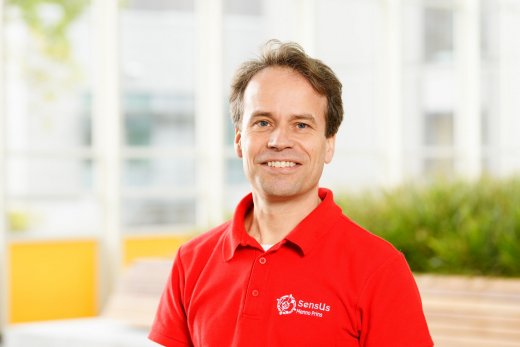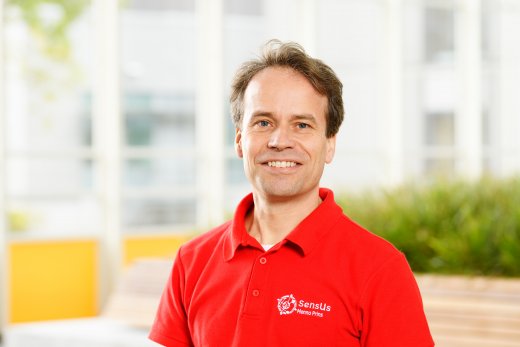01/09/2018
SensUs interviews: Menno Prins
The founder of SensUs is Menno Prins, a professor at Eindhoven University of Technology, working in the field of Molecular Biosensing for Medical Diagnostics. To get an insight in the man behind our mission we interviewed him, revealing his history, his thoughts about antibiotic resistence and his expectations for this year.
1. Who are you and what are your daily activities on the TU/e? What is your history with biosensors?
I am a professor at Eindhoven University of Technology working in the field of biosensors. Before that, I worked for many years in industry. I am fascinated by new technologies for biochemical sensing and applications in the fields of near-patient testing and patient monitoring, so my thoughts go to fundamental questions as well as to applications and translation to society. SensUs has good synergy with all these aspects, as it stimulates education as well as innovation and entrepreneurship.
My main responsibilities are to train and inspire young scientists. Students need to acquire basic knowledge as well as to learn how to become creative with this knowledge. For creativity they need to learn how to think independently and dare to walk new paths. Research is one way to learn such skills, and SensUs is another. Particularly demanding in SensUs is the need to work together as a team and be as effective as possible in reaching a goal. This is what I learned myself when working in the industry, and what I hope that all students learn when they participate in SensUs.
2. The theme of SensUs 2018 is “Measuring antibiotics for better healthcare”. Why is this relevant to society?
Antibiotics are anti-microbial drugs that have transformed medicine and saved millions of lives. However, due to wide-spread use of the drugs, bacteria are appearing to be less and less sensitive to the available drugs, a problem called Anti-Microbial Resistance (AMR). Therefore, antibiotic treatments should change and should be given in a much more precise way: patients should receive the right drugs at the right dose, at the right time for the right duration. This is where biosensors can help, because they will give accurate and timely data on drug concentrations in the patient. Based on this data, the treatment of the patient can be adapted and will be as effective as possible, with minimal appearance of resistant bacteria.
3. Do you see a future for point-of-care testing and biochemical patient-monitoring in the field of antibiotic treatment?
Point-of-care testing refers to a sample that is taken from the body, e.g. a finger-prick drop of blood, and that is measured in a small instrument. This can be very useful for testing at the doctor’s office or by the patient at home. However, some infections are acute and lead to hospitalization in the intensive care. Those patients will benefit from being continuously monitored by a biosensor connected to the patient with a catheter, so that drug concentrations as well as indicators of treatment effectiveness and side effects can be monitored continuously.
4. What are the technological difficulties in designing a biosensor for an antibiotic? Why don’t we have such a biosensor already?
Molecules that are essential for the body, such as proteins, hormones, and drugs, are present in the blood in low concentrations, typically between micromolar down to picomolar concentrations. Such measurements are normally done in a laboratory using large instruments, where blood samples are processed through an elaborate process with multiple steps and biochemical reagents. A biosensor is very different, because the test should be rapid and the device should be small. This demands novel technological approaches in biochemistry, fluid handling, and detection, without compromising on the accuracy of the final measurement result. In addition to the technological challenges, economical challenges play a role as well. The development of a new medical product requires a considerable financial investment, which is made only if there is an attractive business model with clear medical added value and a cost-effective technological solution. So to get back to your question: There is not yet a biosensor for detecting antibiotics on the market because there is not yet a technological solution that meets all medical and business requirements.
5. How does SensUs contribute to these developments?
SensUs trains students in multidisciplinary technological development and entrepreneurship, and SensUs brings together stakeholders such as university professors, medical professionals, and companies. This generates new ideas and new solutions, some of which will help to close the gaps between technology, medical application and business.
6. This year is already the third edition of SensUs. Where do you see the competition in 5-10 years?
I see SensUs increasing its impact and scope. First of all, SensUs has every year a different medical theme, so we will address a broad panel of disease areas in the coming 5-10 years. Secondly, I expect that the overall results of the SensUs teams will improve every year due to the collective SensUs learning experience. Furthermore, the SensUs Organization focuses on learning and innovation. Every year we have new ideas on how SensUs can be improved and we run small pilots to test new approaches. For example, this year we have pioneered an entrepreneurship training for the teams. We are eager to see how this will affect the results of the teams, which will steer the design of next year’s entrepreneurship training. In the coming years we plan to develop other new initiatives, for example in the field of student traineeships at companies, and we would like to find ways to stimulate the creation of startup companies or other translational activities. In 5-10 years I think SensUs will be a reputed worldwide competition with impact in several ways, some of which we cannot yet foresee.
7. Finally, do you have any advice for the participating teams?
Make the best of it and enjoy the SensUs days!


Facebook
YouTube
LinkedIn
Instagram